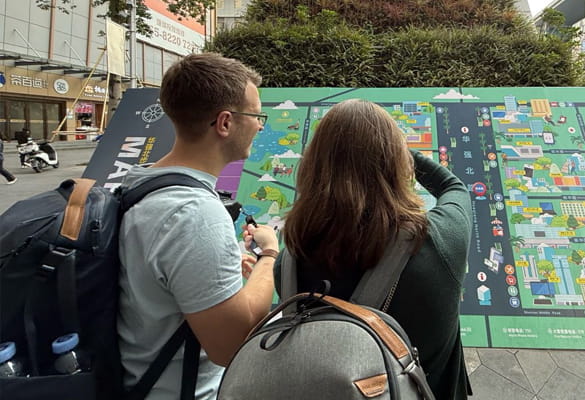China is a captivating country, filled with rich cultural heritage, breathtaking landscapes, and modern innovations. From the ancient wonders of the Great Wall and the Forbidden City to the bustling streets of Shanghai and the tranquil beauty of Jiuzhaigou Valley, there’s something for every type of traveler. While China is an increasingly safe and welcoming destination, it’s still important to travel smartly and responsibly to ensure a smooth and enjoyable experience. Here’s an expanded, positive, and practical guide to help you travel safely in China.

Jiuzhaigou Valley Scenic and Historic Interest Area in winter
1. Understand Local Regulations and Respect Local Customs
Before traveling to China, it’s helpful to familiarize yourself with the local laws and customs. China has specific regulations regarding what you can bring into the country, so it’s important to check the customs rules. While China is a very open and hospitable country, travelers must respect its regulations, which are put in place to maintain public safety and order.
For instance, you should check if the medications you plan to bring are allowed, as some common over-the-counter drugs in other countries might not be permitted. China also has strict regulations against bringing in controlled substances or any items that could be considered offensive to local culture.
Respecting local customs is just as important. Chinese culture is deeply rooted in respect, and learning about basic etiquette can make your trip more enjoyable and respectful. For example, the concept of “face” is very important, so showing humility and avoiding direct confrontation is appreciated. It’s also customary to exchange business cards or gifts with both hands as a sign of respect.
2. Embrace Mobile Payments for Convenience and Security
China is a world leader when it comes to mobile payments, and it’s the most convenient and secure way to manage your finances while traveling. Apps like Alipay and WeChat Pay are used for everything, from paying for taxis, shopping, dining, and even bills. In fact, cash is rarely used in many cities, and you’ll find that mobile payment is available at even the most remote tea houses, markets, and restaurants.

It is popular in China to use mobile phones or facial recognition for electronic payments
To set yourself up for easy transactions, you can either use your international credit card or open a local bank account with a Chinese mobile payment platform. Don’t forget to enable security features on your phone like facial recognition or fingerprint lock for added protection. By using mobile payments, you reduce the risk of theft and avoid the inconvenience of carrying large amounts of cash or credit cards.
3. Travel with Reliable Transportation Options
China’s transportation infrastructure is vast and sophisticated, and it offers travelers a wide range of safe and reliable options. Whether you’re traveling between cities or within a city, you’ll find modern and efficient systems that are designed for convenience and safety:
- High-Speed Trains: China’s high-speed trains are famous for their punctuality, comfort, and speed. They’re a great way to travel between major cities like Beijing, Shanghai, Xi’an, and Chengdu. You’ll find that booking tickets is easy through official websites or apps. Be sure to keep your passport and train ticket with you, as you’ll need them for boarding.
- Ride-Hailing Services: Apps like Didi Chuxing provide an easy and safe way to get around in cities. These services allow you to track your ride, choose your preferred driver, and pay directly through the app. It’s a safer and more reliable alternative to traditional taxis, and you don’t need to worry about language barriers since the app offers multi-language support.
- Public Transportation: Public buses and subways in China are extensive, clean, and generally very safe. In major cities, like Beijing, Shanghai, and Guangzhou, the metro systems are well connected and offer a fast and affordable way to get around. Although it’s very safe, during rush hours, trains and buses can get crowded, so keep your belongings close to avoid any mishaps.

Traveling by high-speed train in China is very convenient, safe, and fast
4. Practice Personal Safety and Be Aware of Your Surroundings
While China is a relatively safe country, it’s always good practice to stay aware of your surroundings, especially in crowded places or tourist attractions. You’ll find that most locals are friendly and willing to help, but it’s still important to take basic precautions:
- Keep Your Belongings Secure: Even though pickpocketing is rare, it’s always a good idea to keep your valuables secure. Use a money belt or a secure bag with zippers when in busy areas or on public transportation.
- Stay Vigilant in Crowded Areas: Popular tourist destinations like the Great Wall, Tiananmen Square, or Shanghai’s Nanjing Road can get very crowded. While it’s a great opportunity to experience the hustle and bustle, keep your bag and belongings close, especially when in large crowds.
- Trust Your Instincts: If something doesn’t feel right, trust your instincts and remove yourself from the situation. In major cities, you can always rely on local authorities or the police if needed.
5. Take Health Precautions and Stay Comfortable
Your health and well-being are a top priority during travel. Fortunately, China offers excellent medical facilities, especially in larger cities. Here are some practical tips to ensure a safe and comfortable trip:
- Vaccinations: Check with your healthcare provider before your trip about recommended vaccinations. Common vaccines for travelers to China include Hepatitis A, Hepatitis B, and Typhoid. It’s always a good idea to be up-to-date on routine vaccines as well.
- Water and Food Safety: Street food in China is delicious and is an important part of the local culture. However, make sure you’re eating from reputable vendors to avoid any stomach issues. Stick to bottled water and avoid drinking tap water unless you’re in a high-end hotel that provides it. If you have any dietary restrictions, be sure to carry any necessary medication with you, as finding certain international food items might be challenging.
- Personal Hygiene: Always carry hand sanitizer or disinfecting wipes when traveling, especially when visiting rural areas where hygiene standards might differ. It’s also a good idea to bring your own toiletries to ensure comfort.
6. Understand Emergency Services and Healthcare
China has a well-developed healthcare system, and major cities have world-class medical facilities. For medical emergencies, always have travel insurance that covers health-related expenses. Below are some important emergency contacts to keep handy:
- Police: 110
- Ambulance: 120
- Fire: 119
Hospitals in larger cities are well equipped, and many have English-speaking staff, although rural areas might have fewer English-speaking professionals. It’s always helpful to have a translation app handy in case of a medical emergency.
7. Keep Your Important Documents Safe
Your passport, visa, and other travel documents are critical during your trip. Always store them in a secure place, such as a hotel safe. Additionally, keep photocopies of important documents in case of loss or theft. Digital backups, stored securely online, are also a good idea, ensuring you can access your information even if you lose the physical copies.
8. Learn About Local Customs and Etiquette
China has a rich cultural heritage, and learning about local customs can help you make the most of your experience while avoiding misunderstandings:
- Greetings: A handshake is the most common form of greeting. It’s typically gentle and polite. In some formal settings, bowing slightly may also be considered respectful.
- Dining Etiquette: Wait for the host to start eating before you begin. Don’t point with chopsticks, and avoid sticking them upright into a bowl of rice, as this resembles a funeral custom. If you’re invited to someone’s home, it’s customary to bring a small gift.
- Religious and Cultural Sites: When visiting temples, shrines, or other sacred places, it’s important to dress modestly and follow the guidance of staff. In many cases, removing your shoes before entering indoor spaces is expected.
9. Stay Connected with Loved Ones
While traveling in China, it’s essential to keep in touch with family and friends back home. You can purchase a local SIM card upon arrival or use international roaming services to stay connected. Many cafes and hotels provide free Wi-Fi, but be mindful of the risks when using public networks. For sensitive transactions, it’s better to use a VPN or rely on mobile data.
Additionally, keep a list of emergency contacts, such as the local embassy, consulate, or family members, in case you need help while abroad.
In summary, China is a very safe country, and the extensive surveillance system on its streets and alleys ensures the safety of both property and personal well-being for every tourist. You can enjoy a secure and enjoyable travel experience in China!





